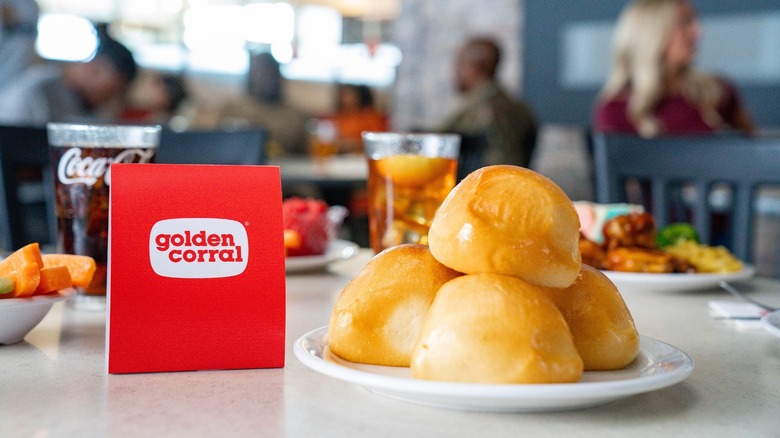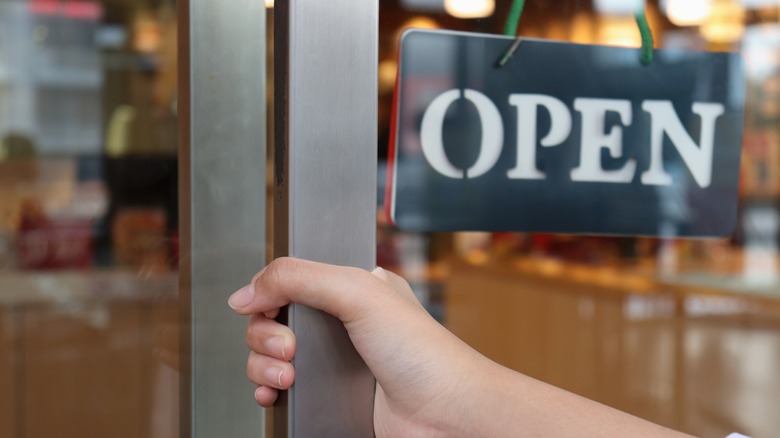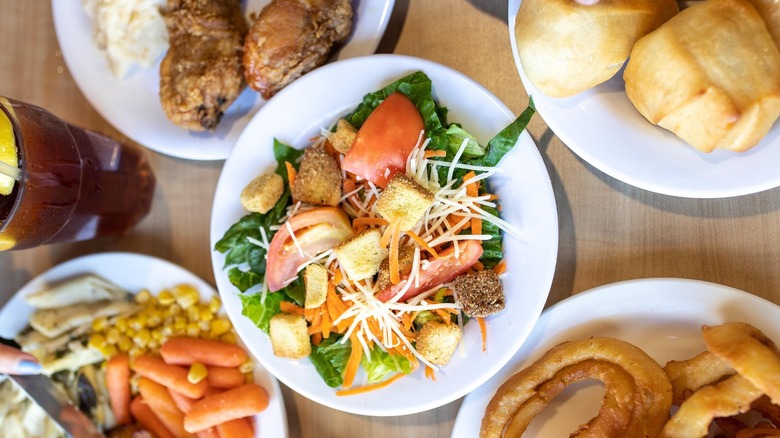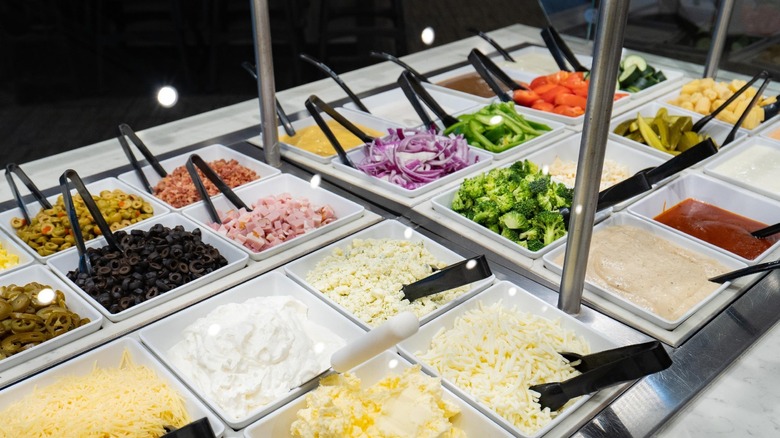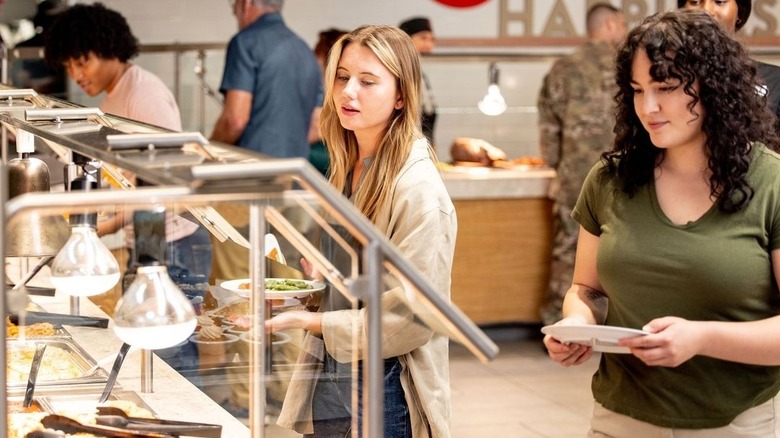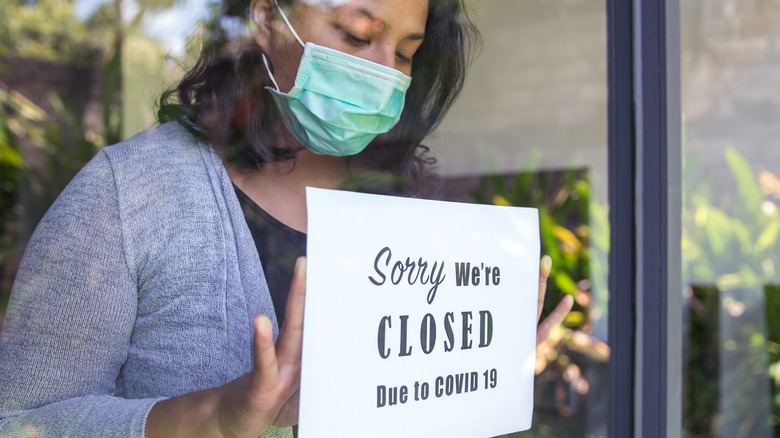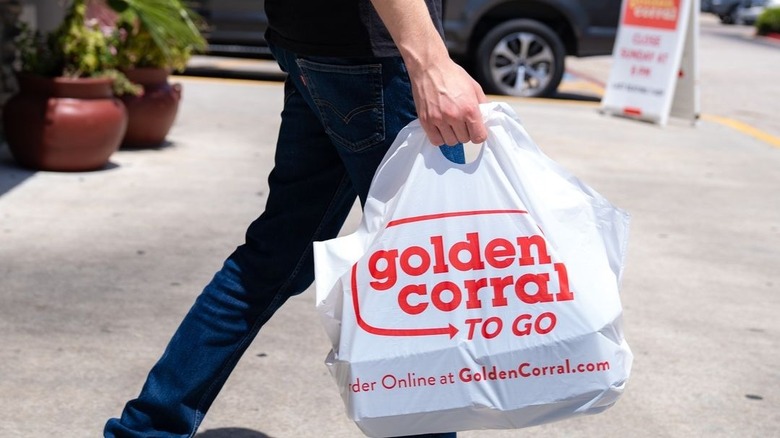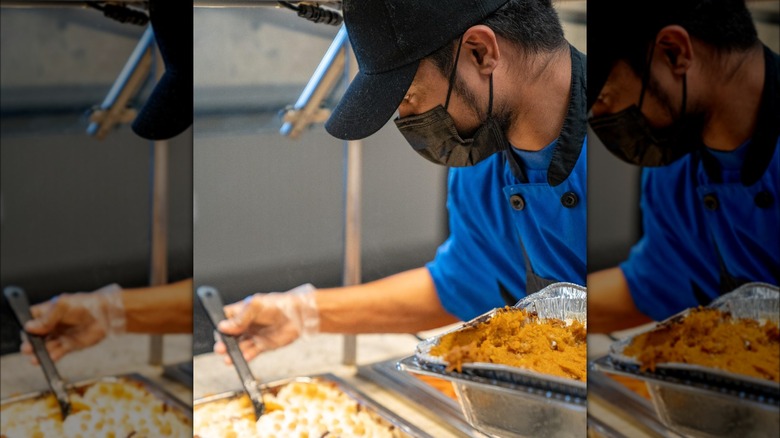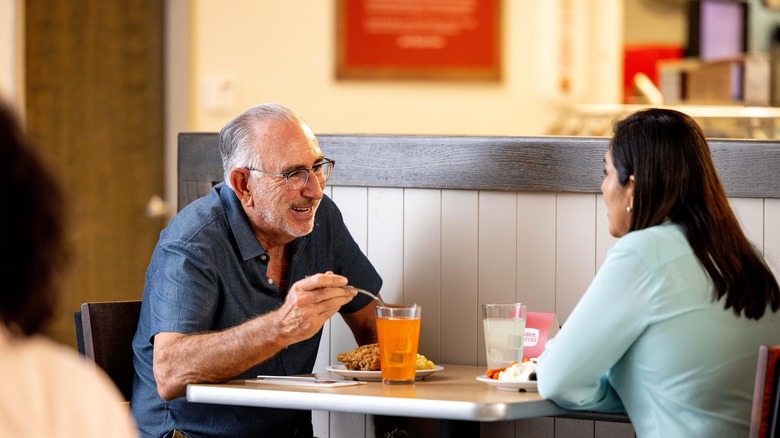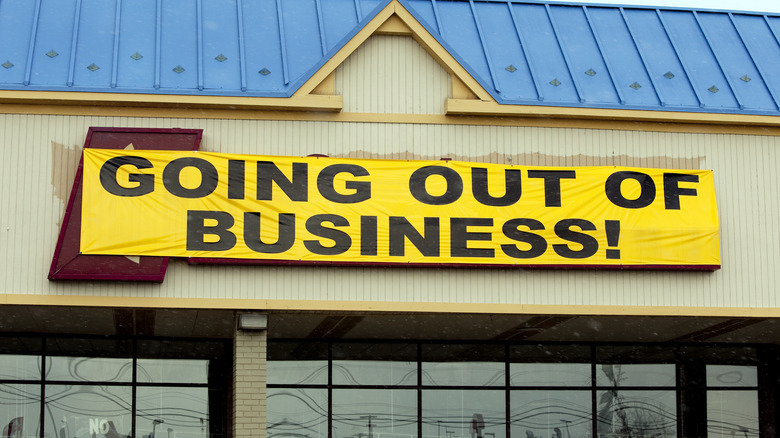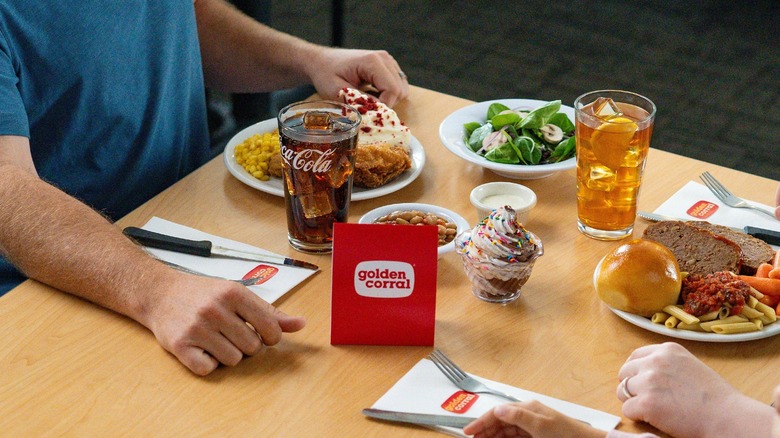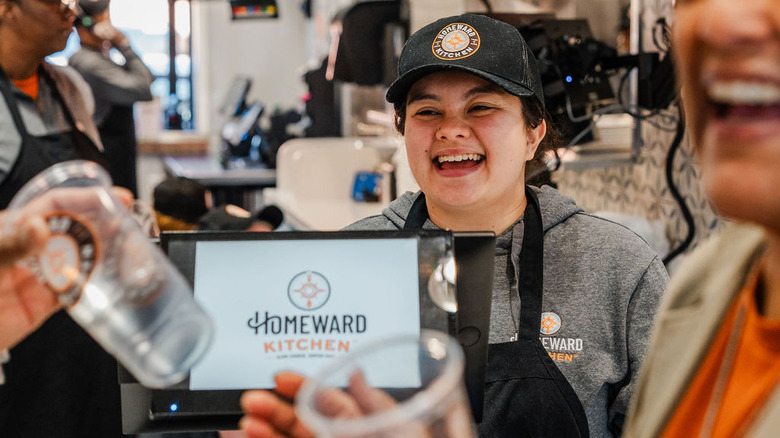How Golden Corral Pulled Itself Out Of Restaurant Ruin
With close to 400 locations throughout the United States, Golden Corral is one of the most successful buffet restaurants in the U.S. Since its founding in 1973, Golden Corral has become the epitome of the "quantity over quality" meal plan that many Americans turn to in the hopes of getting their fill. Although Golden Corral is not considered one of the best buffet restaurants in the U.S., it has become incredibly popular. In fact, Golden Corral labels itself as "America's #1 Buffet And Grill." With locations in 40 states and territories, it's hard to argue against that title.
But like all businesses that have been able to stand the test of time, Golden Corral has certainly faced its fair share of challenges. From P.R. nightmares to a once-in-a-generation pandemic that threatened our everyday lives, obstacles have come in all shapes and sizes for the buffet chain. Yet through it all, Golden Corral has not only weathered the storm, but continues to flourish. Thanks to a few innovative practices and help from an unlikely source, it appears that America's go-to buffet restaurant will be around for a long time. So pick up a plate and check out exactly how Golden Corral was able to pull itself out of restaurant ruin.
Golden Corral opens its doors
In the early 1970s, James H. Maynard and William Carl set their sights on opening up a restaurant in their home state of North Carolina. After being unable to convince several major chain restaurants to sell them franchise rights, the pair decided to create their own restaurant. With the help of several independent investors, Maynard and Carl opened the Golden Steer in 1973 in Fayetteville, North Carolina. In an interview with Nation's Restaurant News, Maynard noted of his team of investors, "Most of the original shareholders were friends who were schoolteachers and educators," Maynard said. "I always knew that schoolteachers were smart folks."
As Maynard and Carl prepared to open up their second location less than a year later, they decided to change the restaurant's name to Golden Corral. It didn't take long before Maynard and Carl began rapidly expanding their business. "We had three restaurants open and two of them were losing money," Maynard said. "At that point, we began to question our concept. We opened a casual-dining restaurant that was profitable, and that helped get us over the hump." Less than 10 years after first opening its doors, Golden Corral had 200 locations. Although the buffet chain eventually slowed down its aggressive expansion, the company has continued to grow over the last 40 years.
Understanding what its customers are looking for
Deciding on what to eat for dinner can feel like a full-time job sometimes. But after the dust settles and your stomach finally tells you what it wants to eat, you then have to choose which restaurant to go to. This conundrum is the reason for every all-you-can-eat buffet's existence. Why stress over where and what to eat when you can have it all under one roof?
And if the allure of limitless potential meals isn't quite enough to win you over, then surely the price will be enough to convince you, right? For restaurants like Golden Corral, offering a buffet at a fairly reasonable price is the most powerful marketing tool it has available. For many people, being able to customize their meal in a million ways while saving some of their hard-earned money is a large factor when choosing where to eat. Golden Corral capitalized on this desire from consumers to build a successful business in its early years.
The decline of the all-you-can-eat buffet
It's hard to pinpoint the exact peak of the classic American buffet restaurant, but most experts would consider the 1980s as the likely answer. Restaurants such as Hometown Buffet and Golden Corral benefited greatly from the popularity of buffets in that decade. However, with a country-wide rapid expansion of buffet restaurants, there began to be an oversaturation of options for consumers. As the novelty of buffets wore off, it became apparent that there was an unsustainable number of buffet locations competing with each other.
By the 2000s, the once enticing appeal of all-you-can-eat buffets began to diminish in the eyes of the American public. With an increased demand for health-conscious menus, buffet-focused restaurants saw a major decline in overall business. Although Americans still wished to get the most bang for their buck, they now wanted to do so while achieving a healthy lifestyle. Unfortunately for buffets, they're often associated with unhealthy eating. The buffet industry had been in decline for years before COVID-19 came and made the business even more difficult.
Golden Corral took a massive publicity hit in 2013
For all-you-can-eat buffets like Golden Corral, the overhead costs of preparing large quantities of food can be surprisingly low, especially when the food is kept simple. Menu items such as mashed potatoes, meatloaf, and fried chicken can be made in bulk with relative ease and a limited number of ingredients. However, one major drawback when it comes to preparing mass amounts of food is making sure food safety regulations are always being observed. Two Golden Corral locations found this out the hard way.
In 2013, a Golden Corral in Port Orange, Florida made national headlines when an employee uploaded a video on YouTube highlighting an unappealing method of disposing of raw hamburger patties. The video showed containers of meat that were left outside of the restaurant next to the dumpsters. A spokesperson for the restaurant maintained that the meat was never served to customers and the location's manager was terminated for failure to follow proper food handling procedures.
In a separate Golden Corral location, another whistleblower revealed unsanitary conditions within its Portsmouth, Ohio kitchen. The former employee posted a detailed account listing over a dozen problematic concerns within the restaurant. The employee recalled specific incidents such as raw chicken being served on the buffet line and fish being left in room temperature conditions. Ultimately, the employee reached a settlement with Golden Corral and declined to comment any further on the restaurant.
The impact of COVID-19
Despite the waning popularity in the eyes of the public, all-you-can-eat buffets were still holding on at the beginning of 2020. For Golden Corral, business was steady in 2019. The company saw nearly $1.8 billion in revenue across its 483 locations. That's less than a 2% drop from the previous year's revenue. But as COVID-19 began to spread across the globe in early 2020, businesses were offered a grim projection for what was up ahead.
In March 2020, the U.S. government issued a nationwide emergency and many states began mandating lockdowns and shelter-in-place protocols. By March 25, 2020, Golden Corral furloughed nearly 2,300 employees after shutting down all 35 of its company-operated restaurant locations. As the uncertainty of COVID-19 continued throughout the country, the restaurant chain held a virtual town hall meeting for all employees. "It is truly an emotional and challenging time for our country," Golden Corral president and CEO Lance Trenary said during the town hall. "The realities of the current situation have forced us to make difficult decisions" (via Restaurant Business).
Staying open during uncertain times
With COVID-19 disrupting everyday life, Golden Corral, along with thousands of other restaurants, was forced to adjust to a new way of operating business. The pandemic required companies to pivot in order to survive. But unfortunately for many restaurants, the toll that COVID-19 took on the country was too much to overcome. According to The Washington Post, 90,000 restaurants closed either temporarily or permanently by spring 2021. With many independent restaurants unable to alter their standard operating procedures, the outlook for the industry looked grim. However, for Golden Corral, the ability to improvise proved to be financially beneficial.
Prior to the statewide lockdowns that restricted indoor dining, Golden Corral implemented a series of protocols to help combat the spread of infection. With the lockdowns in place, Golden Corral expanded its takeout service to include curbside pickup and drive-thru options in many locations. Despite the pandemic, Golden Corral managed to limit losses, with an estimated revenue of $1.48 billion in 2020.
Unhappy employees
Golden Corral may have avoided complete restaurant ruin during the COVID-19 pandemic, but the company's employees felt the burden of working in the restaurant long before 2020. Despite facing blowback from multiple whistleblowers unveiling the restaurant's unsanitary working conditions, many current and former Golden Corral workers complain that the company still suffers from an unclean atmosphere. In one scathing review on Indeed, a former employee criticized the company's tendency to overwork its employees to the point of exhaustion. "When I first started working there it was a nice clean healthy environment with great staff and great food but as they overworked and underpaid [their] great reliable staff the place started falling apart," they wrote, adding, "nasty food, dirty tables and sections."
On top of facing adversity inside the workplace, thousands of employees also dealt with an unsavory occurrence outside of it as well. In August 2023, Golden Corral reported a data breach that exposed the personal information of close to 180,000 current and former employees. The breach in the company's digital security allowed hackers to obtain the names, Social Security numbers, driver's license numbers, financial account information, medical information, health insurance information, and credentials of those affected.
A loyal fan base
One of the reasons Golden Corral has persisted despite the buffet industry's struggles, worker complaints, and the pandemic is the continued patronage of regular customers. Whether it's a small-time coffee shop or a national chain restaurant, regulars are a key part of any successful business. And Golden Corral is no exception. For decades, the buffet giant has steadily built a small army of loyal patrons who often make Golden Corral their home away from home. And who can blame them? With dozens of options on the buffet line, they could throw together a different plate of food each day of the month and never eat the same meal twice.
But who are those diehard Golden Corral loyalists? As reported by Business Insider, the average Golden Corral customer is an African American who has already reached retirement. According to a study by the analytics firm Numerator, the typical customer also visits the restaurant five times a year, spending just under $30 on each trip. Although the typical Golden Corral customer doesn't break the bank during their visits, their loyalty has helped keep the company operating through financially difficult times.
A thinning competitive field
As the buffet restaurant industry returns to a sense of normalcy following COVID-19, Golden Corral has found itself playing against a less competitive field. Unlike in previous decades, Old Country Buffet is no longer a big player in the buffet game. Old Country Buffet's parent company, Fresh Acquisitions, has filed for bankruptcy multiple times in recent years. After riding out the 2008 financial crisis, Old Country Buffet succumbed to the public's dwindling interest in buffets. As of Fresh Acquisitions' latest bankruptcy filing in April 2021, the once-popular buffet restaurant chain (as well as other buffet chains owned by Fresh, like HomeTown Buffet and Ryan's), had shuttered all of its locations.
Another casualty of America's lack of interest in buffets has been Sizzler. Perhaps one of the most iconic chain restaurants in its heyday, Sizzler's collection of restaurants has dwindled from over 250 to under 100, with locations mainly in California. The chain had to file for bankruptcy in 2020 because of the pandemic.
Despite seeing its toughest and most direct competitors withering away over the past decades, Golden Corral has done enough to weather the storm and remain mostly intact. In what used to be an oversaturated market, Golden Corral now stands on top of the national buffet restaurant chain mountain, with fewer competitors to take it down.
Helping out its franchisees
Sometimes, the biggest difference between failure and success can be something as simple as receiving a helping hand. For David Conklin, Golden Corral's chief development officer, going through the trials and tribulations of the pandemic helped shape the company's outlook on supporting its own restaurants. In an interview with Restaurant Dive, Coklin highlighted Golden Corral's vision for all of its current and future franchisees. "The pandemic has taught us that we need to continue to do that work with our franchisees, that we need to be innovative," Conklin said.
In order to better work with its franchisees, Golden Corral instituted a franchise incentive program in July 2022. The program is designed to "help franchisees combat growing operations costs." The bulk of the program centers around offering discounts and credits to new locations in an attempt to offset the costs of purchasing supplies. "Golden Corral is cutting a check back to their food service supplier to help pay for their food and reduce their costs and help with inflation," Conklin said. "We saw this as an opportunity to fight inflation, help with new store growth, and help build that pipeline." Golden Corral may not be the most profitable restaurant franchise you can own, but it has its benefits.
Freshening up the concept
In 2017, Golden Corral revealed a brand new prototype building in Greensboro, North Carolina. The design of the remodel prototype was dubbed "Gateway" by the company. The building layout was Golden Corral's attempt to usher in a brand new era for the buffet chain and appeal to a younger demographic. The restaurant redesign offered wider spaces with an emphasis on creating a more relaxed and peaceful dining experience. The new-look restaurant also tried to improve the workflow of the Golden Corral kitchen. Despite being smaller in size, the Gateway design strived to improve the overall efficiency by making the most of the space provided. Although COVID-19 slowed down the company's roll-out of the remodels, freshly remodeled Golden Corral restaurants have begun to pop up in the U.S.
While speaking to Nation's Restaurant News, Golden Corral president and CEO Lance Trenary revealed that the company has visions of returning to its original steakhouse roots in some locations. "We're not going to compete with the Texas Roadhouses or LongHorns or Outback," Trenary said. "But we believe that there might be a segment under them." As Golden Corral continues to see how it fits in with modern dining tastes, the buffet chain appears to have no plans to play it safe.
Going viral on social media
One of the most important aspects of any restaurant is its reputation. For the majority of restaurants, the quality of their food will always be the main selling point. However, for most buffet restaurants, the quantity of the food can take precedence over the quality. Even Golden Corral's popular menu items can vary in quality. One Golden Corral location found success focusing its marketing message on making its employees seem fun and likable, rather than talking about the food.
In December 2023, New York City's very first Golden Corral decided to think outside the box while promoting its restaurant. The Bronx Golden Corral uploaded a video featuring four employees dancing in front of the location's entrance to the restaurant's Instagram page. Within just a few weeks, the post spread all over the internet, becoming a viral sensation. In another case of free publicity, one TikToker decided to see how much bang she could really get for her buck. While visiting a Golden Corral in Indianapolis, the woman stayed in the restaurant for 12 hours after purchasing just a single $12 meal. "I was just curious what it'd be like to be there all day. And what times are the biggest, busiest times," the woman told WTHR.
Looking ahead to the future
Golden Corral is looking ahead to the future. In December 2023, Golden Corral opened its first Homeward Kitchen location in Southern Pines, North Carolina. The spinoff restaurant features a smaller design that focuses more on home-style cuisine. Homeward Kitchen is Golden Corral's first fast-casual restaurant and will work as a pilot location for the company.
In a Golden Corral press release, Golden Corral Corporation president and CEO Lance Trenary revealed the company's plans for Homeward Kitchen. "We see an opportunity to provide wholesome, crave-able food for families on the go. We're excited to launch a concept that combines high quality, freshly prepared, classic comfort foods, with the convenience of being able to enjoy them in the restaurant, on the go, through the drive-thru, or at home," says Trenary. According to Trenary, depending on Homeward Kitchen's success, Golden Corral will look to expand the Homeward Kitchen brand across the country. The fast-casual restaurants won't replace the class Golden Corral locations, but they will serve as an alternative for customers.
